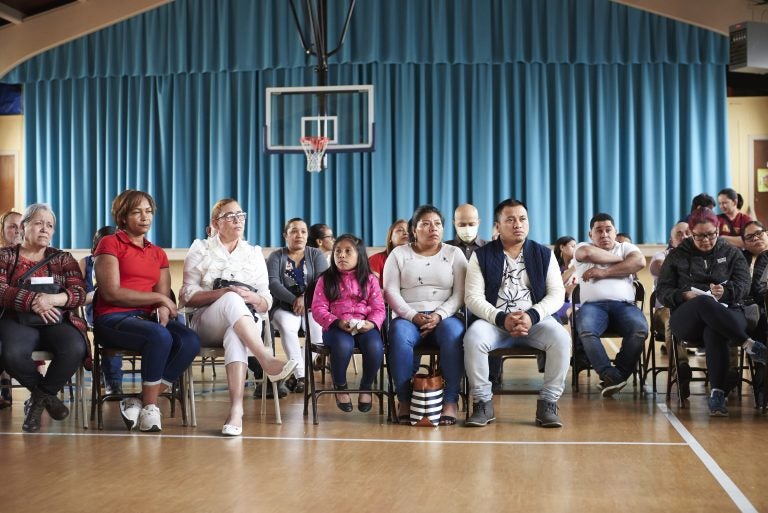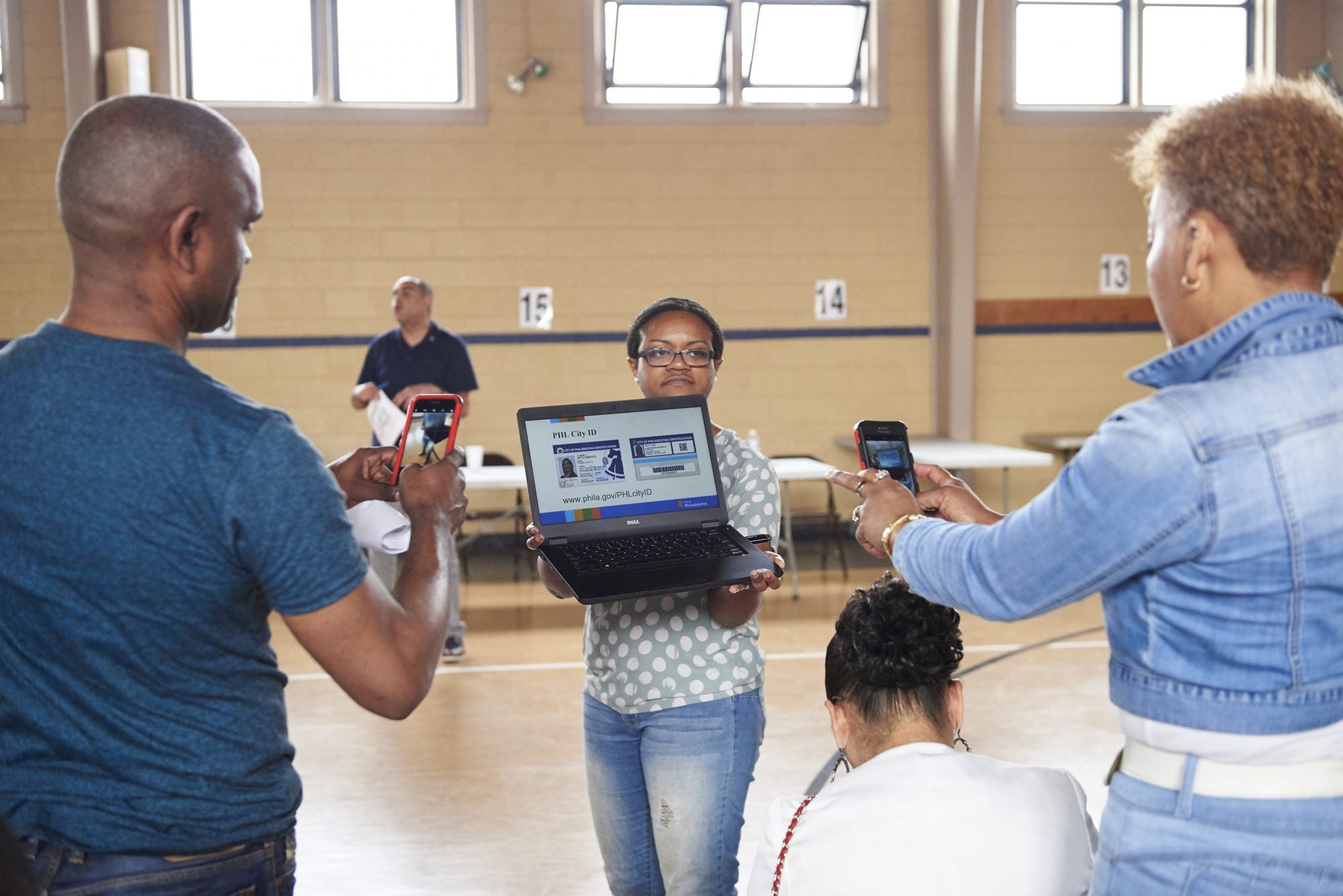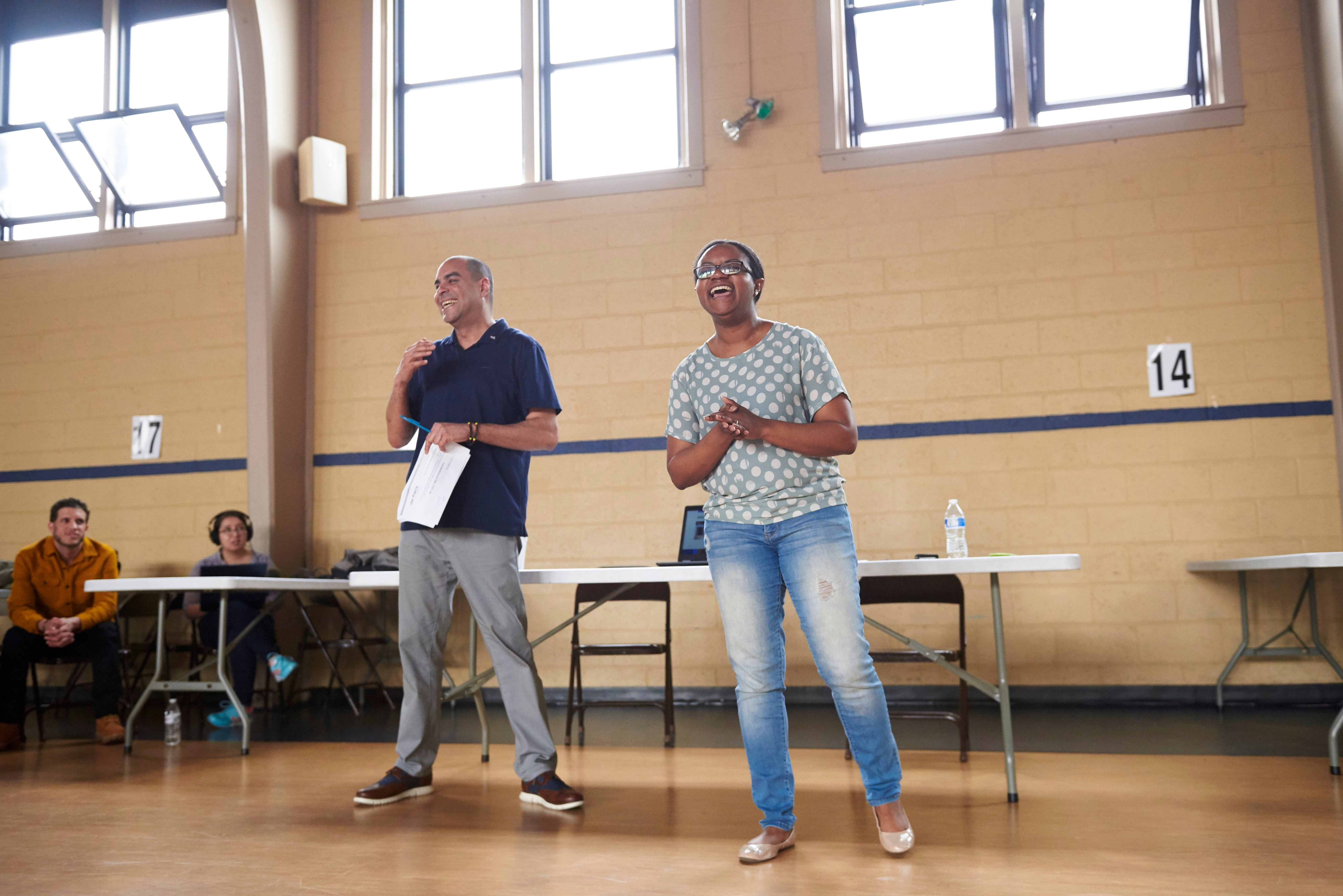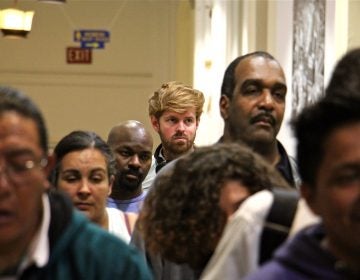‘It’s for everyone:’ Philly tries to dispel worries about ID program in immigrant communities
“We want to make sure that in the streets, people don’t think that this is an ID only for immigrants,” ID program director Amy Eusebio told a crowd in North Philly.

About 50 people attended a Spanish-language information session about Philadelphia's new municipal ID program at Holy Innocents Roman Catholic Church in North Philadelphia on Sunday, April 7, 2019. (Natalie Piserchio for WHYY)
Farida Gutierrez de Torres lives in the Hunting Park neighborhood of North Philadelphia. She recently obtained a green card, but it was mailed to an old address — she recently moved — and her passport, which she used as her main form of identification, expired.
That combination of events has put Gutierrez de Torres in a bind.
“For example, I go to a bank to open an account. They say, ‘Your ID is expired, you can’t.’ I go to cash my work check. If they see that my ID, my passport, is expired, I could also have problems,” she said. “Everything’s in chaos if I don’t have my ID.”
Gutierrez de Torres has had trouble getting one from the state of Pennsylvania and she needs one quickly so she can accept a new job offer.
She heard about Philadelphia’s new municipal ID, which officially launched on Thursday, during mass at Holy Innocents Roman Catholic Church.
“Technically in this country, I’m legal, but when they ask me for an ID for certain things, I do fear I’ll be rejected because I don’t have an ID,” said Gutierrez de Torres, who plans to make an appointment with the city next week.
Gutierrez de Torres and about 50 of her fellow congregants attended a Spanish-language information session in a gymnasium attached to the church hosted by the New Sanctuary Movement of Philadelphia Sunday afternoon, where Municipal ID Program Director Amy Eusebio and Pedro Melecio, an engagement and outreach worker with the program, laid out what the card can and cannot be used for.

The card will not be accepted outside of the city, for travel, or for getting into federal buildings.
It can be used to obtain some discounts, for signing into Philadelphia school buildings and accessing recreation centers, and to interact with local law enforcement.
Dispelling concerns
Before the program’s official rollout, Eusebio and Malecio said they have been working their connections with community groups to get the word out — and to dispel fears.
In North Philly, Eusebio and Malecio found the bulk of attendees didn’t know anything about the program, although attendees that heard rumblings about the program had some concerns.
Juan Carlos Romero is originally from Mexico City and has been living in the U.S. illegally for about 17 years.
While Romero and his wife thought Philadelphia’s municipal ID program would be an advancement to the cause of undocumented immigrants, he said he also had reservations about giving his information to a government agency.
“One of the doubts that we had was like, ‘Well now with these IDs they’re marking us,’ but no, that’s not it,” said Romero. “I think we should get that out of our heads and look at the benefits.”
Romero says while he can’t think of a time when not having an ID has been a hindrance on his life, having one would allow him to play a greater role in his almost 10-year-old daughter’s school life.
“(The school) invites us to go on trips to the museums, to the zoo, lots of places where they ask for IDs and this is a good option,” said Romero, who plans to make an appointment with his wife next week to sign up for cards.
Melecio and Eusebio told attendees that the office keeps minimal information about recipients. The city doesn’t keep a running archive of the documents people submit to the city to get a card.
The city does keep track of identification-holders’ names, the date the cards were issued, the expiration date of the cards, and recipients’ dates of birth. No addresses or images are stored.
‘We don’t want to give it a label’
To avoid giving the cards a stigma of being an ID only used by undocumented immigrants, the city is partnering with local institutions to attract a broad base of users.
“We don’t want to give it a label,” said Melecio. “We don’t want for everyone to think that the ID is only for immigrants. It’s for everyone who lives in the community and in Philadelphia.”
For example, the card is a way to get discounts at the African-American Museum and The Kimmel Center for the Performing Arts. Municipal ID cardholders can also get $5 off tickets to one Phillies game every month.
The IDs will also connect people with rideshare discounts, said Melecio. There are plans in the works to make it so that some credit unions take the card as a primary identification.

The only reason some information is kept on file is so the police know that the ID actually came from the city. For that reason, if you lose the ID, you have to go through the application process again.
“We want to make sure that in the streets, people don’t think that this is an ID only for immigrants,” Eusebio told the crowd. “Because that doesn’t help you either.”
Undocumented immigrants aren’t the only ones in need of official documents that prove who they are. Melecio said the cards are also helpful to those experiencing homelessness, people coming out of prison, and members of the LGBTQ community looking to change their names.
Still, he said the new ID program will also help some undocumented immigrants come out of the shadows.
“It’s getting them out so people can make (police) reports, so they’re not afraid to make reports,” he said. “It’s getting them out so the person can walk in the community without fear because they have an ID backed by the municipality.”
Jesus J. said he was disappointed the ID wasn’t a substitute for a driver’s license, but he’s still inclined to get one. WHYY agreed to withhold his last name because Jesus J. is not authorized to be in the U.S. and is nervous about disclosing his immigration status publicly.
“At least if someone from the authorities stop me, if I need something as a form of identification, at least I have that to give them so they know I’m of the community,” he said.
Eusebio said the department has issued 605 IDs to the community since the soft launch of the program on March 28.
Demand is getting so high for the office of five people that the department encourages making an appointment ahead of time. There are plans to launch mobile sites and soon walk-ins will be limited to Wednesdays.
The city plans to hold more information sessions in the coming weeks to answer questions and spread the word.
WHYY is your source for fact-based, in-depth journalism and information. As a nonprofit organization, we rely on financial support from readers like you. Please give today.





